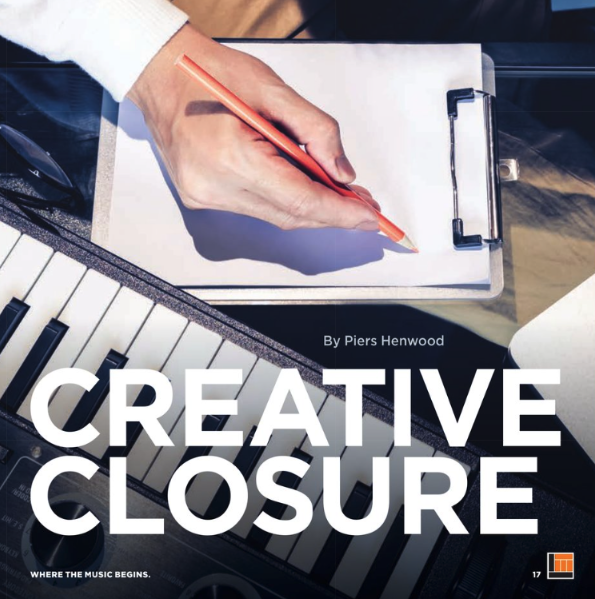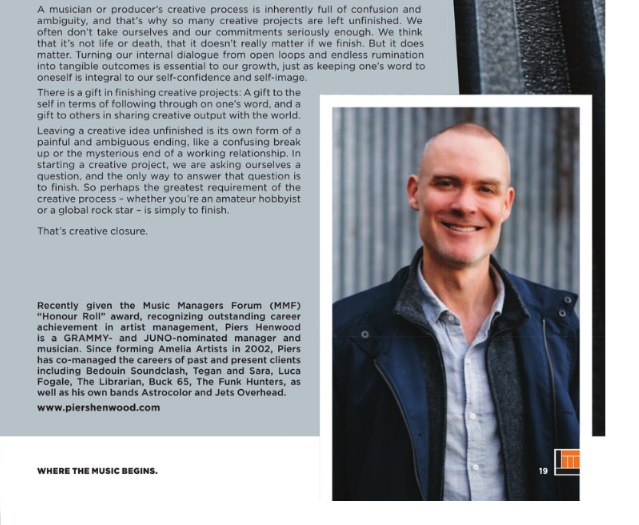Creative Closure
Life is full of open loops – circular internal dialogues and unfinished tasks that rattle in our heads. This is especially true for the musician, songwriter, or producer who must bring order to the amorphous creative process. While an open drum loop in your DAW might inspire creativity, too many open loops in your creative life leads to gridlock and endless unfinished projects.
That's why creative closure is essential.
We know that broken human relationships benefit from closure, and the concept of closure is also useful to illuminate the psychology of the creative process. When human relationships sit in an extended state of uncertainty, all parties suffer. Whether it's a romantic relationship or a working relationship, it's difficult to move forward in an environment full of unanswered questions. Similarly, when creative projects remain ambiguous, the creative individual or team suffers, and the creative spirit is dampened.
Psychologists Arie Kruglanski and Donna Webster originally coined the phrase "need for closure" in 1994. According to Kruglanski, "The need for cognitive closure refers to individuals' desire for a firm answer to a question, and an aversion toward ambiguity.”
Applying this concept to the creative process is helpful because creative projects often represent an ambiguous internal relationship with oneself. In creating something from nothing, the artist must embark on a process that challenges his or her self-identity. Therefore, when we habitually don't finish creative projects, we live in an ambiguous relationship with an essential part of our selfhood. We may even subconsciously take on commitments in other areas of life to avoid facing the difficulty of tackling our creative work.
Because the creative process is inherently ambiguous, one of the most important ways to create fulfillment is by consistently seeking creative closure. And how do we do that? It starts and ends by finishing projects!
It sounds obvious enough, but it's never easy in the creative realm. Indeed, finishing one creative project is far more difficult than having five in an open loop. Creative people like to tinker on open loops, and tinkering is an essential part of learning an instrument, coming up with song ideas, and expanding our production or engineering skills. But when it comes to putting art and creativity into the world, we can't tinker endlessly. The open loop can become the lazy default, characterized by a lack of decision-making and perhaps a lack of confidence. So we must embark on steps that move a project from A to B.
The tension is that no creative project ever feels complete to the creator; there is always a looming after-thought, that metaphorical or literal note that might be added or subtracted. Finishing can become an intense psychological commitment, and people with an artistic temperament are prone to rumination.
On the positive side, this characteristic makes possible the probing insight that a great artist might have. On the negative side, too much rumination begets inaction. For the creative individual, there are few things more dispiriting than getting stalled on creative projects.
But, because it's more difficult, it's also more fulfilling to finish one project than to tinker endlessly on five. When we finish a creative project, we exemplify an important set of personal characteristics that transcend the musical or creative realm. We hold ourselves (and our partners) accountable. We learn to divide a larger task into finite steps. We make a challenging commitment and follow through. We gain valuable experience by adding structure to an ambiguous process. Whether the audience for the creative project turns out to be one or one million, we put an expression of ourselves into the world, and in doing so create personal growth.
And here's the key – creative closure is an equally applicable mindset for the amateur hobbyist as it is for the professional musician. The skills learned from pursuing creative closure apply to all walks of life. Whether we're working in a band or a boardroom, in tech or construction, the habit of finishing what we start is essential – especially when it comes to difficult projects that might be easier to walk away from.
That said, it’s important to acknowledge that not all creative projects are destined to be finished. For example, great songwriters often have a stockpile of unfinished song fragments lying around, and some ideas probably shouldn't see the light of day – creative people need to iterate in order to clear the pipes and get to the best ideas.
However, this fact doesn't change the basic thesis of creative closure, because the thesis is behavioural. Pursuing creative closure is a skill that transcends individual projects. You can still seek creative closure consistently, while accepting that there will be ideas and smaller projects left on the cutting room floor.
As an industry professional, I often get asked by young musicians, “What should I do to achieve A, B, or C?" And while the answer will vary based on circumstance, one universal answer is to do what's in your own control. That starts with making decisions and finishing creative projects. The dominance of streaming platforms means there are no longer gatekeepers in the distribution of music, so any finished project has an opportunity to be heard.
Although finishing creative projects is in our control, it's easier said than done. What are some specific techniques to help get unstuck?
- Write down all of your open loops to get them out of your head and onto the page. This concept originates from the Getting Things Done (GTD) framework by productivity guru David Allen, and has been shown to reduce stress and help identify important areas of focus, creating the basis for future action. There is helpful literature to read by Googling GTD and productivity.
- Write down a list of justifications for finishing the project(s) you identify as priorities. Here you want to focus on outcomes you care about that are in your control. The point isn't to think about a possible market-driven outcome such as being a rock star, but about personal values and learnings that you'll gain from the process of finishing. These will likely include items listed above such as making good on our word, improving skillsets, getting out of our comfort zone, confronting fear, and building self-confidence.
- Find a creative accountability partner, or if you're already part of a group of creatives (eg, a band), create common language around this subject. The creative process is lonely and sometimes requires fortification. Setting up regular co-working sessions with someone who is pursuing similar goals is helpful for sticking to commitments. If you're prone to not following through on your word to yourself, sharing commitments with an accountability partner can help add another level of motivation.
- If you're in a group environment where projects don't finish due to internal debate and disagreement, familiarize yourself with my framework for Creative Diplomacy.
A musician or producer's creative process is inherently full of confusion and ambiguity, and that's why so many creative projects are left unfinished. We often don't take ourselves and our commitments seriously enough – we think that it's not life or death, that it doesn't really matter if we finish.
But it does matter.
Turning our internal dialogue from open loops and endless rumination into tangible outcomes is essential to our growth, just as keeping one's word to oneself is integral to our self-confidence. There is a gift in finishing creative projects – a gift to the self in terms of following through on one's word, and a gift to others in sharing creative output with the world.
Leaving a creative idea unfinished is its own form of a painful and ambiguous ending, like a confusing break up or the mysterious end of a working relationship. In starting a creative project, we are asking ourselves a question, and the only way to answer that question is to finish. So perhaps the greatest requirement of the creative process – whether you're an amateur hobbyist or a global rock star – is simply to finish.
That's creative closure.
This essay originally appeared in the Long & McQuade Magazine Gift Issue 2022.


Piers Henwood Newsletter
Join the newsletter to receive the latest updates in your inbox.